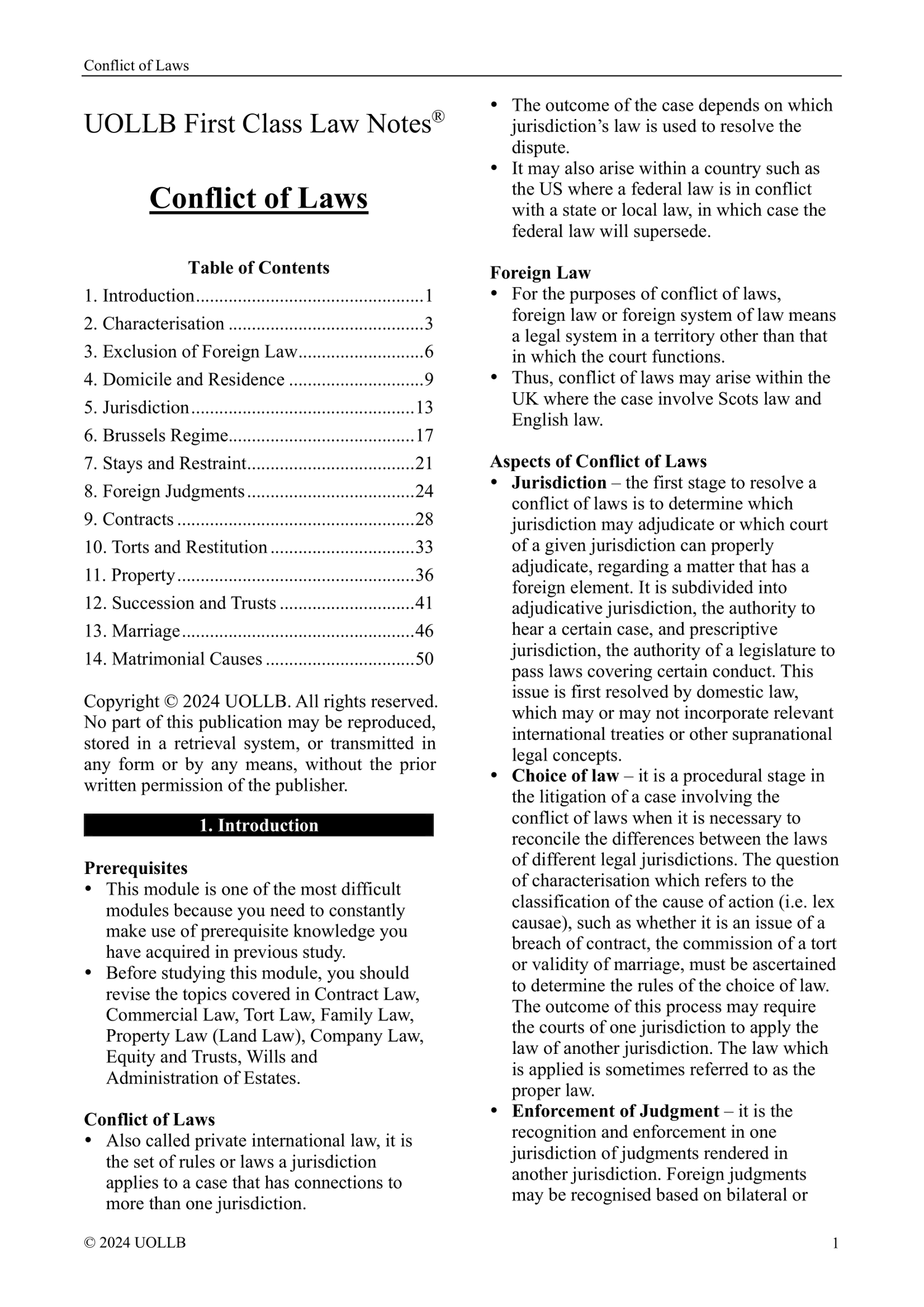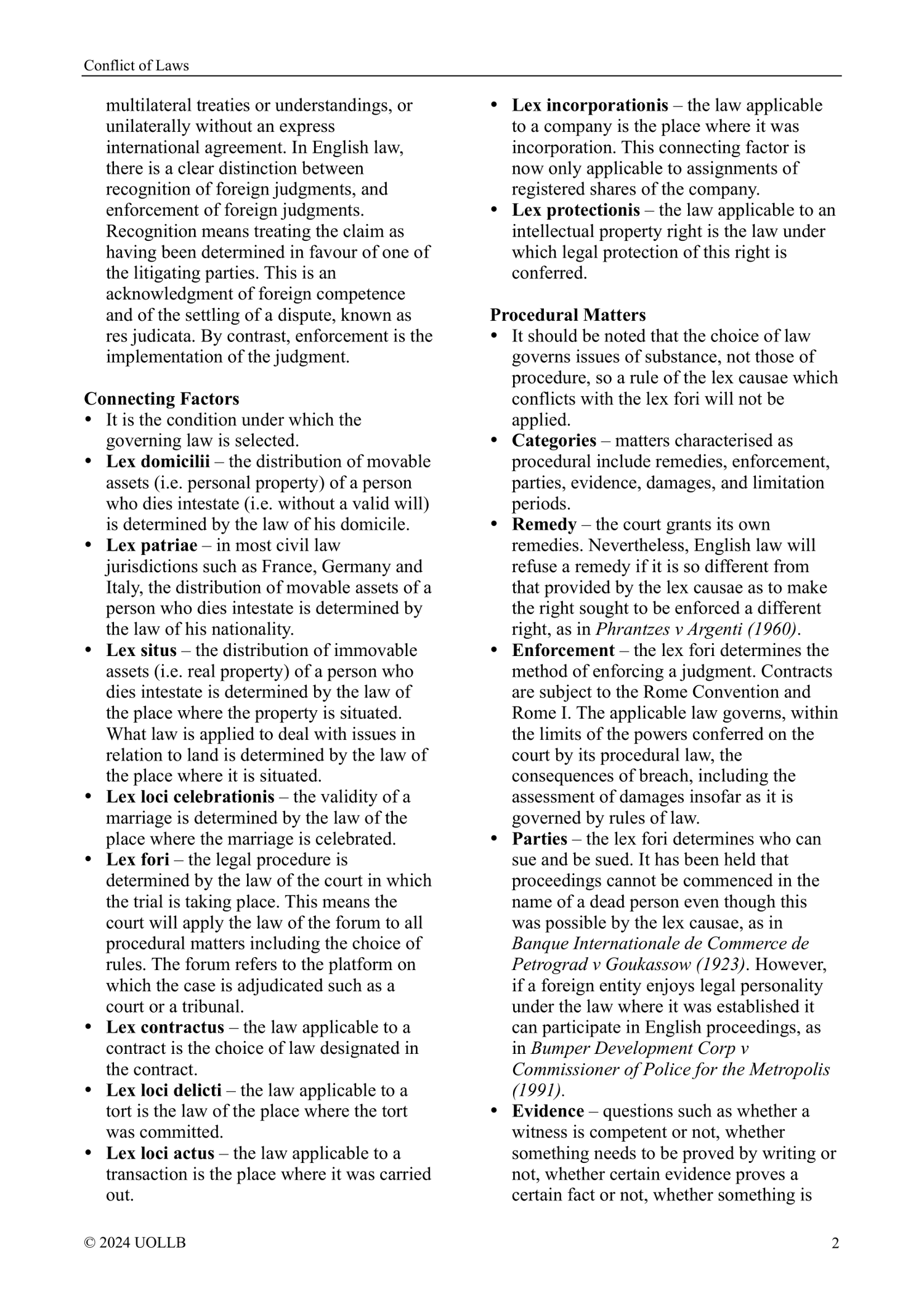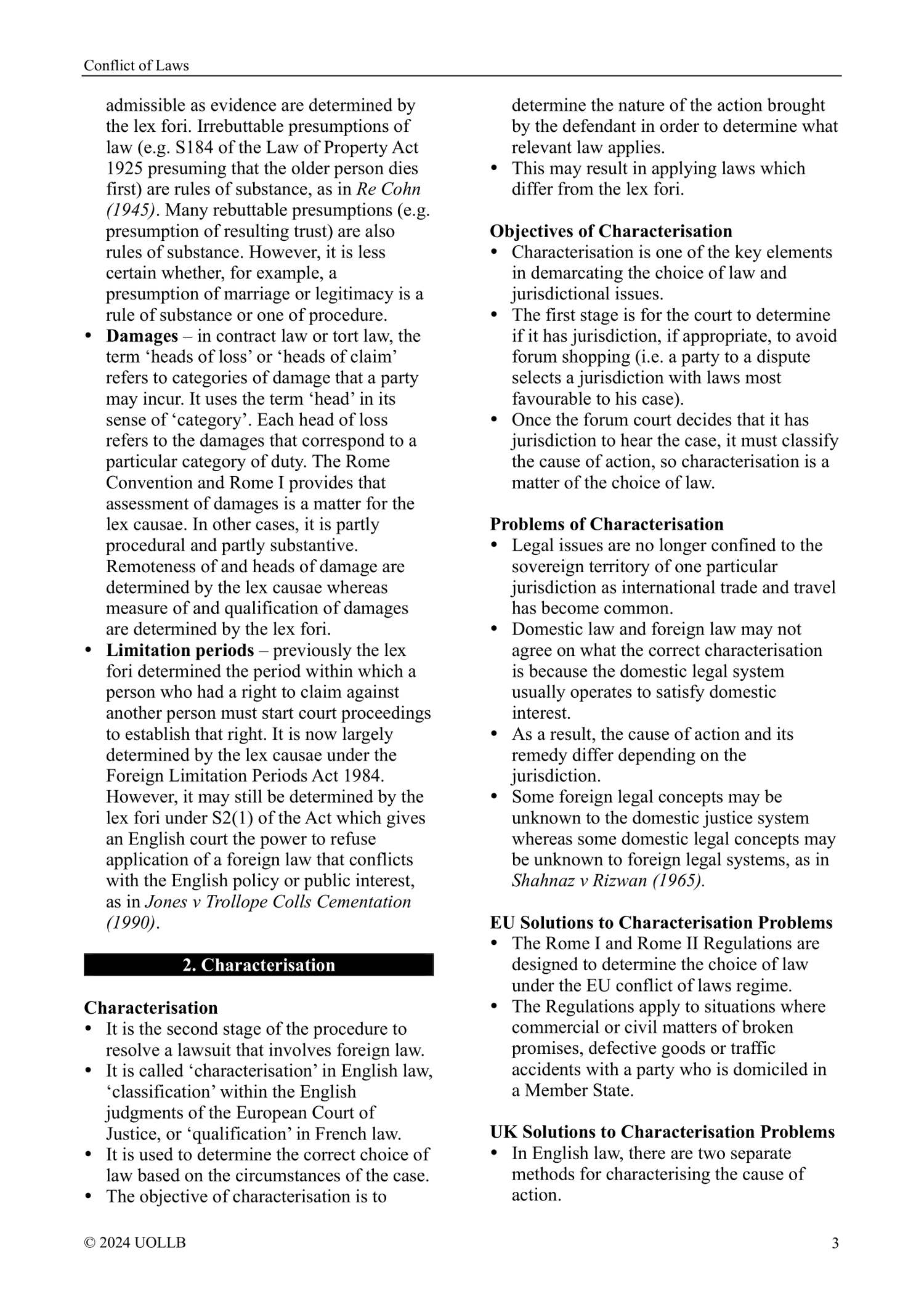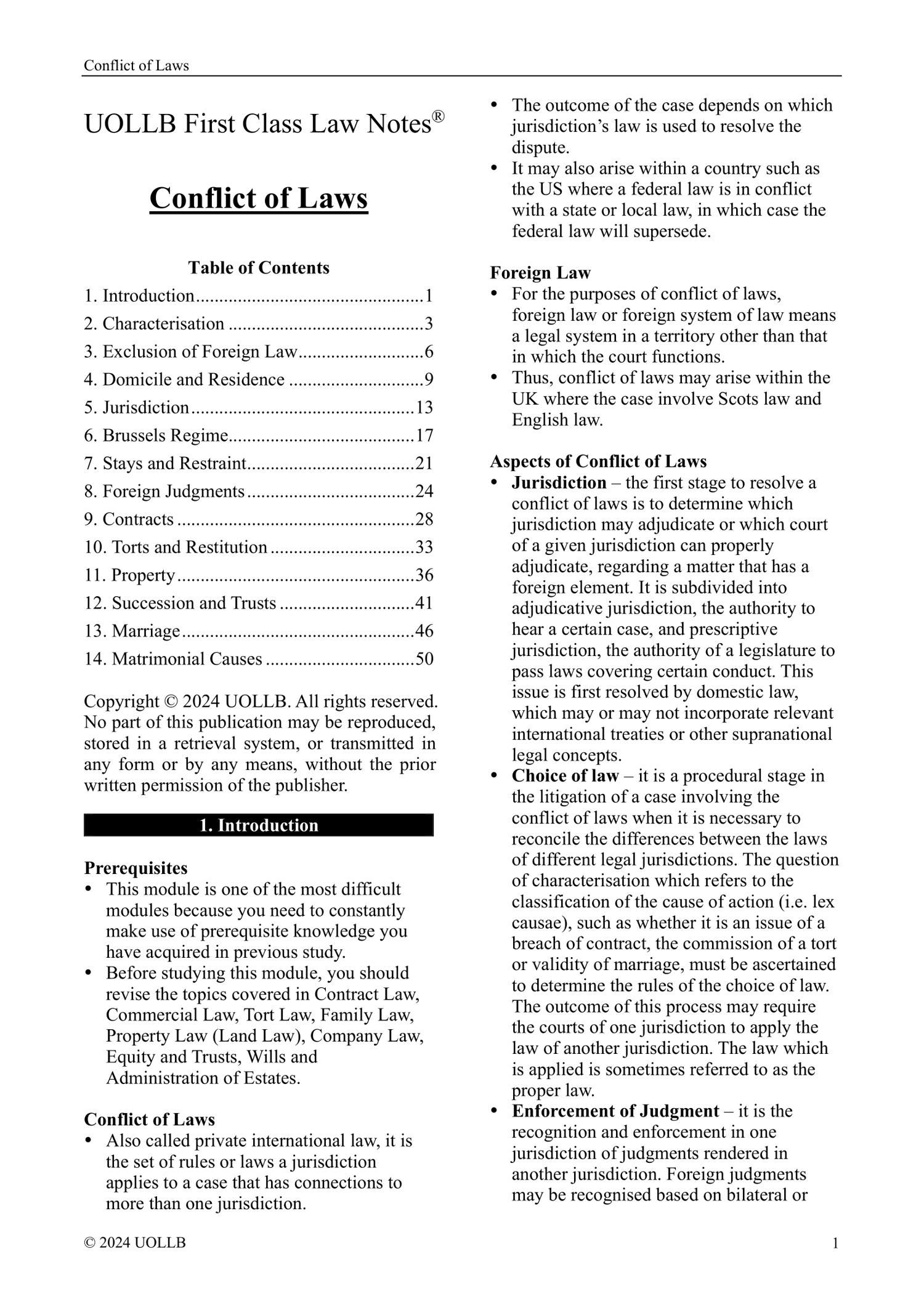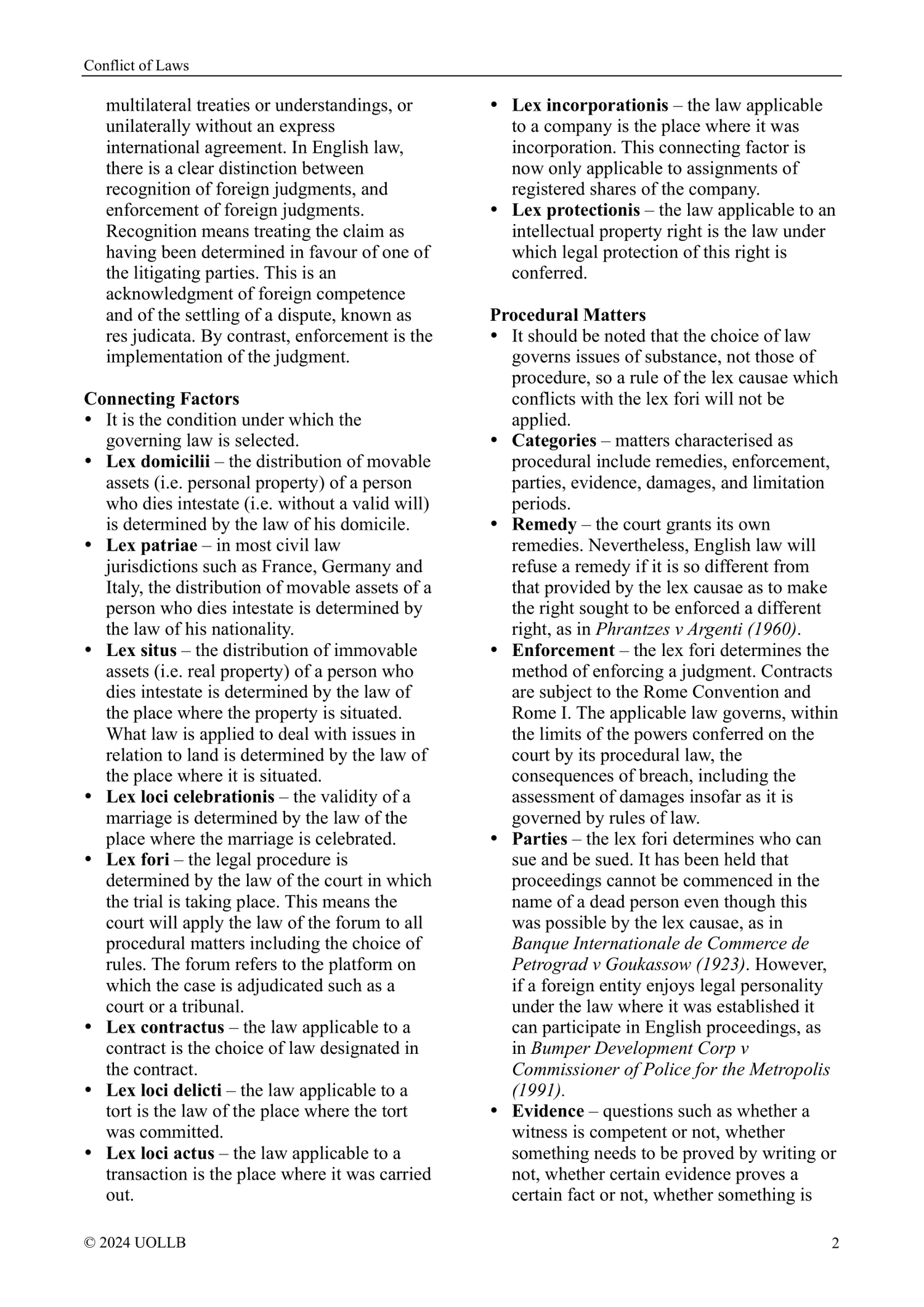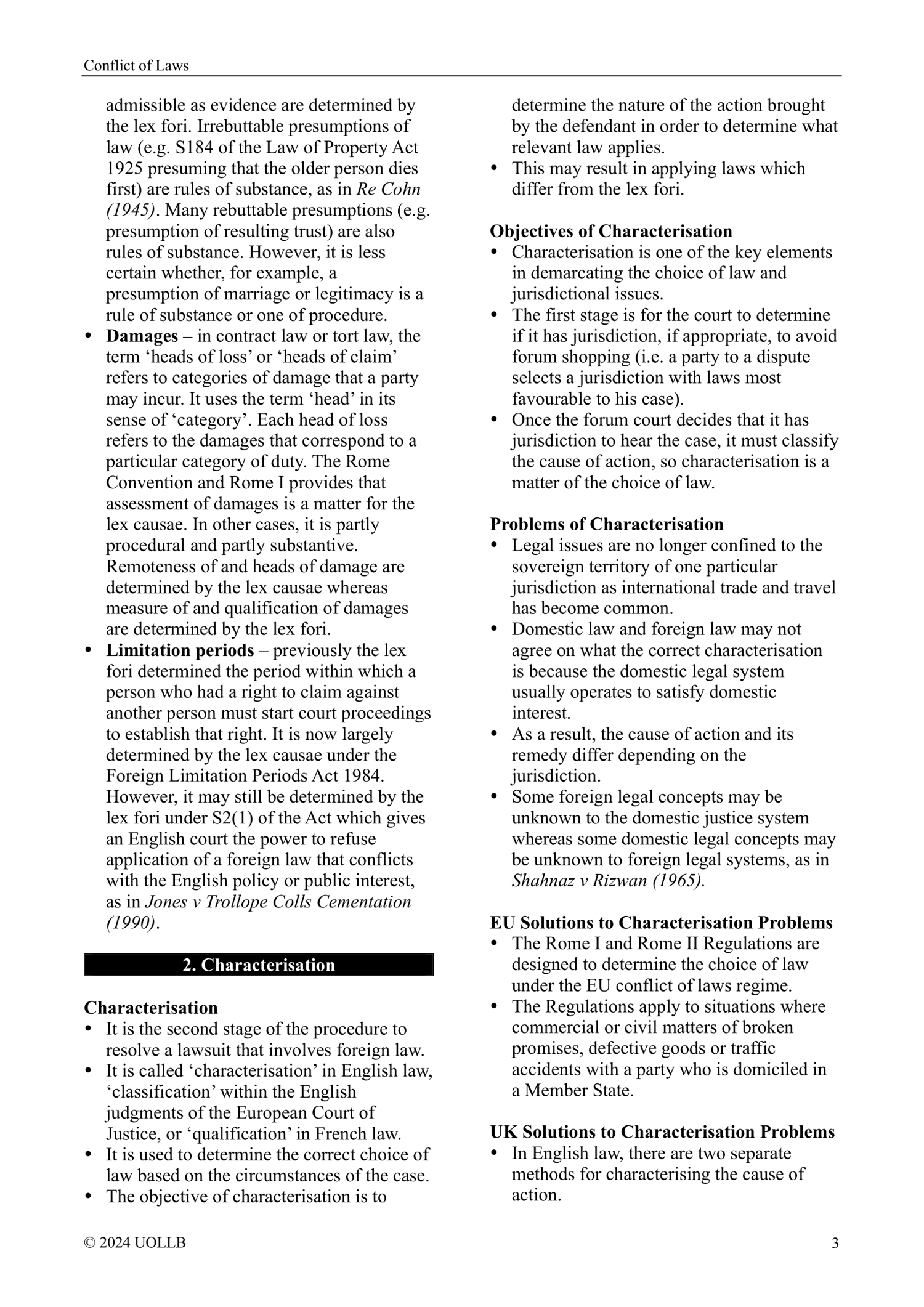Conflict of Laws, also known as private international law, deals with legal issues involving more than one jurisdiction and provides rules and principles to determine which jurisdiction's laws should apply when there is a conflict between different legal systems. You can select this module in Year 3. Although this module is not required for entry into bar training, nor is it assessed in the SQE, it is extremely useful for lawyers who need to advise international clients. Here is a summary of the topics covered in this module.
Nature of Private International Law: Private international law, also known as conflict of laws, is a branch of law that deals with legal disputes involving foreign elements. It determines which legal system's rules should be applied to resolve conflicts when multiple jurisdictions are involved. It seeks to provide predictability and fairness in cross-border legal relationships by establishing principles for determining applicable law, jurisdiction, and the recognition and enforcement of foreign judgments.
Fundamental Conceptions: The fundamental conceptions of private international law include choice of law and jurisdiction. Choice of law refers to the determination of the applicable law in a dispute with foreign elements. Jurisdiction involves deciding which court has the authority to hear and resolve the case.
Classification: Private international law can be classified into several categories. These include jurisdiction (determining which court has authority), choice of law (determining which legal system's rules apply), and recognition and enforcement of foreign judgments (determining whether a foreign judgment is recognised and can be enforced).
Renvoi: Renvoi arises when a court is required to refer back to its own laws to determine the applicable law in a case with foreign elements. It occurs when the foreign jurisdiction's conflict of laws rules point back to the court's own law. Renvoi can create complexity and circularity in determining the applicable law.
Public Policy: Public policy is an important consideration in private international law. It allows a court to refuse the application of a foreign law or judgment if it violates the fundamental principles and values of its own jurisdiction. Public policy acts as a safeguard to protect the public interest and ensure that foreign laws or judgments that are contrary to the forum's public order or basic values are not enforced.
Evasion of the Law: Evasion of the law refers to attempts by individuals or entities to circumvent the intended scope or effect of certain laws or regulations by adopting measures to avoid their application. Private international law aims to prevent such evasion and ensures that the law applicable to a particular case is determined based on legitimate factors and not manipulated or evaded for personal gain.
Incidental Question: The incidental question refers to ancillary issues that arise during the resolution of a main dispute. This is particularly the case when an issue involves international elements. These questions may include matters such as the validity of a contract, capacity of a party, or interpretation of a legal provision. The court must address these incidental questions to provide a complete resolution of the case and ensure justice is served.
Time Factor: In private international law, the time factor refers to the temporal element involved in determining the applicable law or jurisdiction. It involves considering the relevant laws or rules that were in force at the time the dispute or legal relationship arose. The time factor helps ensure consistency and predictability in the application of private international law principles.
Connecting Factors: Connecting factors are criteria used in private international law to determine the applicable law or jurisdiction in a case involving foreign elements. They are used to establish a connection between the legal issue and a particular jurisdiction. Connecting factors can include factors such as domicile, habitual residence, nationality, place of contract, and location of assets.
Domicile: Domicile is an important connecting factor in private international law. It refers to a person's permanent home or legal residence, which is considered their primary connection to a specific jurisdiction. Domicile is typically determined by factors such as physical presence, intention to make a particular place a permanent home, and absence of any intention to reside elsewhere permanently. English law recognises three types of domicile: domicile of origin, domicile of choice, and domicile of dependence.
Habitual Residence: Habitual residence is another significant connecting factor in private international law. It refers to the place where a person has a substantial and regular connection, indicating a certain degree of integration into a particular jurisdiction. Habitual residence is determined by examining the person's actual residence, their intentions, and the duration and continuity of their stay in a particular jurisdiction.
Nationality: While domicile and habitual residence are common connecting factors, nationality is also considered in certain cases. Nationality refers to an individual's legal bond or allegiance to a particular country or state. It can be a connecting factor in determining the applicable law or jurisdiction, especially in matters related to personal status, such as marriage, divorce, and succession. However, the significance of nationality may vary depending on the legal system and the specific issue at hand.
Foreign Elements: Private international law governs the jurisdiction of English courts in cases involving foreign elements. The rules are established to determine whether English courts have the authority to hear a particular case. These rules may consider factors such as the defendant's presence or consent, the location of assets, or the nature of the dispute. The rules aim to balance the interests of fairness, convenience, and judicial efficiency in determining the appropriate jurisdiction.
Staying Foreign Actions: Staying foreign actions refers to the power of a court to suspend or halt proceedings when there is a related case pending in another jurisdiction. Staying foreign actions can avoid parallel or conflicting litigation and promote efficiency in resolving disputes. The court's decision to stay proceedings will depend on various factors, such as the similarity of the issues, the convenience of the parties, and the interests of justice.
Forum Non Conveniens Doctrine: The forum non conveniens doctrine is a principle applied by a court when it determines that another jurisdiction is more appropriate for the resolution of a dispute. It allows a court to decline jurisdiction and suggest that the case be pursued in a different, more suitable forum. The doctrine is based on the notion that a court should consider the convenience of the parties and the interests of justice to prevent unnecessary hardship or inconvenience. The court will assess factors such as the availability of evidence, witnesses, and the connection of the case to the alternate jurisdiction before deciding whether to invoke the doctrine.
Principles of English Private International Law Relating to Persons: When it comes to persons, there are a number of principles English courts use to addresses issuing involving international elements, such as the capacity to marry, divorce, make wills, and the recognition of foreign judgments and legal statuses.
Status: English law recognises the status of individuals, such as their legal identity, nationality, and domicile. Status is generally determined by the law of the individual's domicile, which is their permanent home or place of habitual residence.
Capacity: Capacity refers to a person's legal ability to engage in certain acts or transactions. English law recognises that capacity is generally governed by the law of the individual's domicile at the time of the relevant act or transaction.
Corporations: English law recognises the separate legal personality of corporations and applies principles of corporate law to determine their rights, obligations, and capacity. The law governing a corporation is typically determined by its place of incorporation or the jurisdiction where it has its central management and control.
Marriage: English law recognises marriages celebrated abroad if they comply with the laws of the country where they took place. However, certain restrictions and requirements may apply, especially in cases involving polygamy, same-sex marriages, or marriages involving minors.
Divorce: English law recognises divorce performed abroad if it complies with the laws of the country where it took place. The forum non conveniens doctrine allows the court to decline jurisdiction if another jurisdiction is more appropriate for the divorce proceedings. The court will consider factors such as the parties' connections to each jurisdiction, convenience, and the interests of justice.
Nullity of Marriage: The nullity of a marriage refers to a determination that a marriage is void or invalid from its inception. English law recognises the principle of lex loci celebrationis, which means that the validity of a marriage is determined by the law of the jurisdiction where the marriage was celebrated.
Maintenance Obligations: Maintenance obligations, such as spousal support or child maintenance, are governed by the applicable law determined by the rules of private international law. The court will consider factors such as the parties' domicile, habitual residence, or the jurisdiction where the maintenance claim is brought to determine the applicable law.
Legitimacy: English law recognises the legitimacy of children based on the law of the jurisdiction where they were born or the law of the parents' domicile or nationality. Legitimacy is generally determined by the legal status of the parents' marriage at the time of the child's birth.
Proper Law: Proper law refers to the governing law chosen by the parties to a contract or determined based on the relevant connecting factors in the absence of a choice. It is the law that the parties intend to apply to their contractual relationship or that is deemed most closely connected to the contract. The proper law determines various aspects of the contract, such as its formation, interpretation, performance, and validity. It governs the rights and obligations of the parties, the consequences of breach, and the available remedies.
Form and Interpretation of Contracts: The law governing the form and interpretation of a contract is generally determined by the proper law of the contract, which is the law chosen by the parties or determined based on the relevant connecting factors. The form requirements of a contract, such as the need for a written agreement or the presence of certain formalities, are determined by the governing law.
Illegality: English private international law deals with the issue of illegality in contracts. If a contract is illegal under the governing law, it may be unenforceable or void. The courts will generally apply the law of the jurisdiction where the contract is to be performed or the law with the closest connection to the contract to determine its legality. However, the application of public policy and the protection of the interests of the forum may also play a role in determining the consequences of an illegal contract.
Discharge: Discharge refers to the termination of contractual obligations. English private international law recognises the principles of discharge, such as performance, breach, frustration, or agreement between the parties. The law governing the discharge of a contract is generally determined by the proper law of the contract or the law chosen by the parties.
Torts: English law deals with tortious claims that arise in cross-border situations. The law governing torts is determined by the applicable law rules of the jurisdiction where the harm occurred or the law with the closest connection to the tortious act. The principles of negligence, liability, causation, and damages are applied based on the governing law.
Property: English law addresses issues related to property rights involving international elements. The law governing property rights, including ownership, transfer, and inheritance, is determined by the lex situs, which is the law of the jurisdiction where the property is located. The lex situs principle is generally followed to ensure legal certainty and predictability in property matters.
Movables and Immovables: English law distinguishes between movables (personal property) and immovables (real property). The distinction between movables and immovables is important for determining the applicable law for issues such as ownership, transfer, and security interests. The law governing movable property is the law of domicile of the party (lex domicilii) while the law governing immovable property is the law where it is situated (lex situs).
Transfer of Tangible Property: English private international law governs the transfer of tangible property, such as goods, land, and other physical assets. The law of the jurisdiction where the property is situated (lex situs) generally determines the rules for the transfer of ownership, title, and the rights and obligations associated with tangible property.
Transfer of Intangible Property: English law also addresses the transfer of intangible property, such as intellectual property rights, contractual rights, and financial instruments. The applicable law for the transfer of intangible property is often determined by the governing law chosen by the parties or by the law with the closest connection to the transaction.
Intestacy: Intestacy refers to the situation where a person dies without leaving a valid will. English law determines the rules of intestacy based on the law of the deceased person's domicile or habitual residence at the time of death. The distribution of assets and the rights of heirs are determined according to the applicable law of intestacy.
Wills: English law deals with the validity, interpretation, and execution of wills in cross-border situations. The formal requirements for a valid will, such as writing, witnessing, and revocation, are generally governed by the law of the deceased person's domicile at the time of making the will. However, the law of the jurisdiction where immovable property is located (lex situs) may also have an impact on the disposition of such property.
Administration of Estates: English law addresses the administration of estates, including the appointment of executors or administrators and the distribution of assets. The law governing the administration of estates is generally determined by the law of the deceased person's domicile or the jurisdiction where the estate is being administered.
Trusts: English law also covers trusts, which are legal arrangements where a person (the settlor) transfers assets to a trustee for the benefit of beneficiaries. The validity, administration, and enforcement of trusts are generally determined by the law chosen by the settlor or by the law of the jurisdiction where the trust is administered.
Procedure and Evidence: English law establishes rules and principles concerning procedure and evidence in cross-border cases. It addresses matters such as jurisdiction, service of process, choice of forum, and the admissibility of foreign evidence. These rules ensure fairness and efficiency in cross-border litigation.
Proof of Foreign Law: In cases involving foreign elements, English law provides mechanisms for proving the content and application of foreign law. The courts may rely on expert opinions, official publications, or expert witnesses to establish the content and effect of foreign law.
Recognition and Enforcement of Foreign Judgments and Decrees: English law governs the recognition and enforcement of foreign judgments and decrees. It establishes criteria and procedures for determining whether a foreign judgment should be recognised and enforced in England. The courts apply principles of comity and reciprocity to ensure the effectiveness and cooperation between different legal systems.
Conflict of Laws addresses the challenges that arise in cases with a foreign element, where parties or events have connections to different countries or legal systems. This module covers a wide range of legal issues, including contract disputes, tort claims, property rights, family law matters, and the recognition and enforcement of foreign judgments. It seeks to establish a framework for resolving conflicts between laws, determining jurisdiction, and ensuring predictability and fairness in cross-border legal disputes.
You can learn more about each topic and relevant case law with our exam-focused Conflict of Laws notes.






















